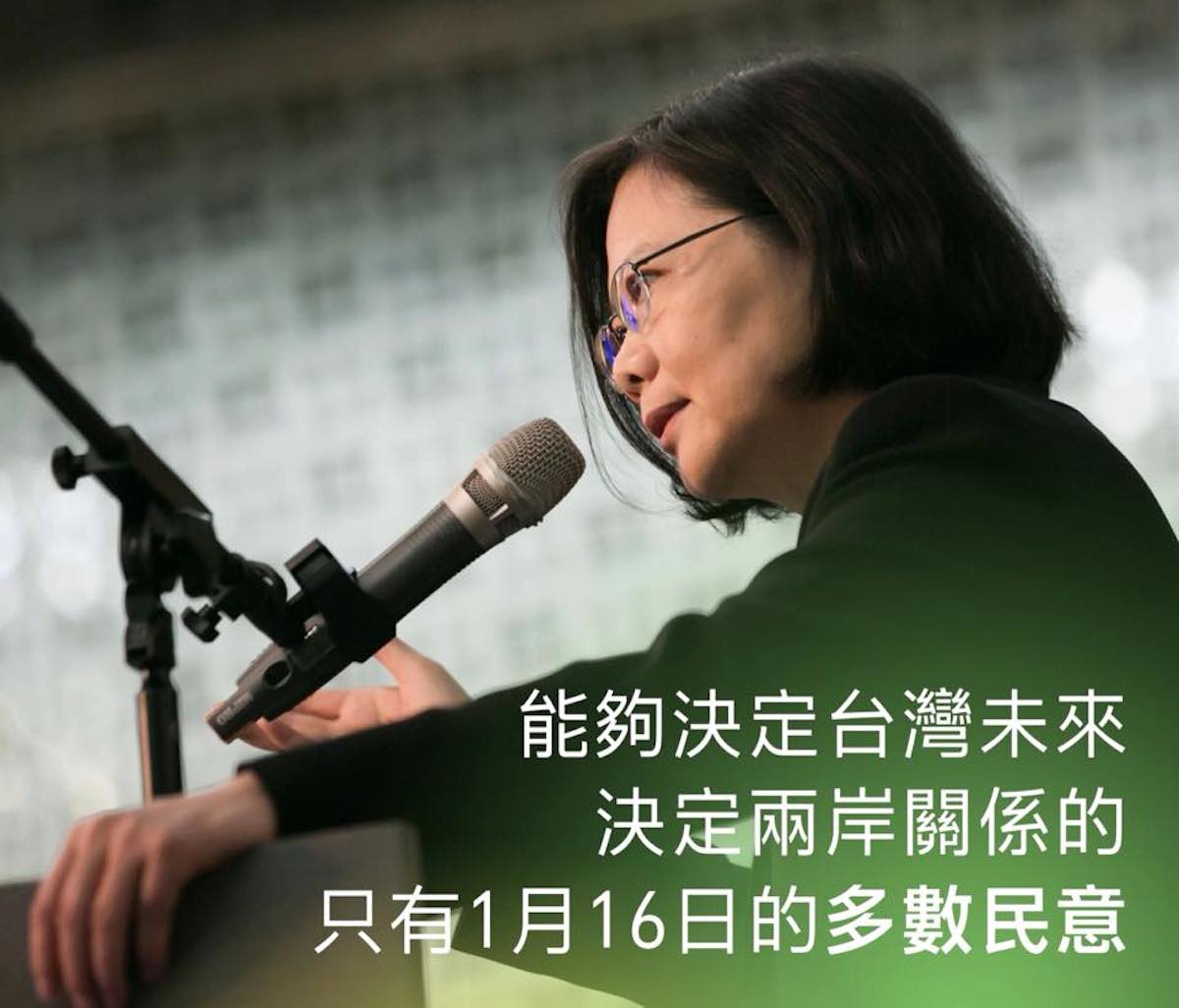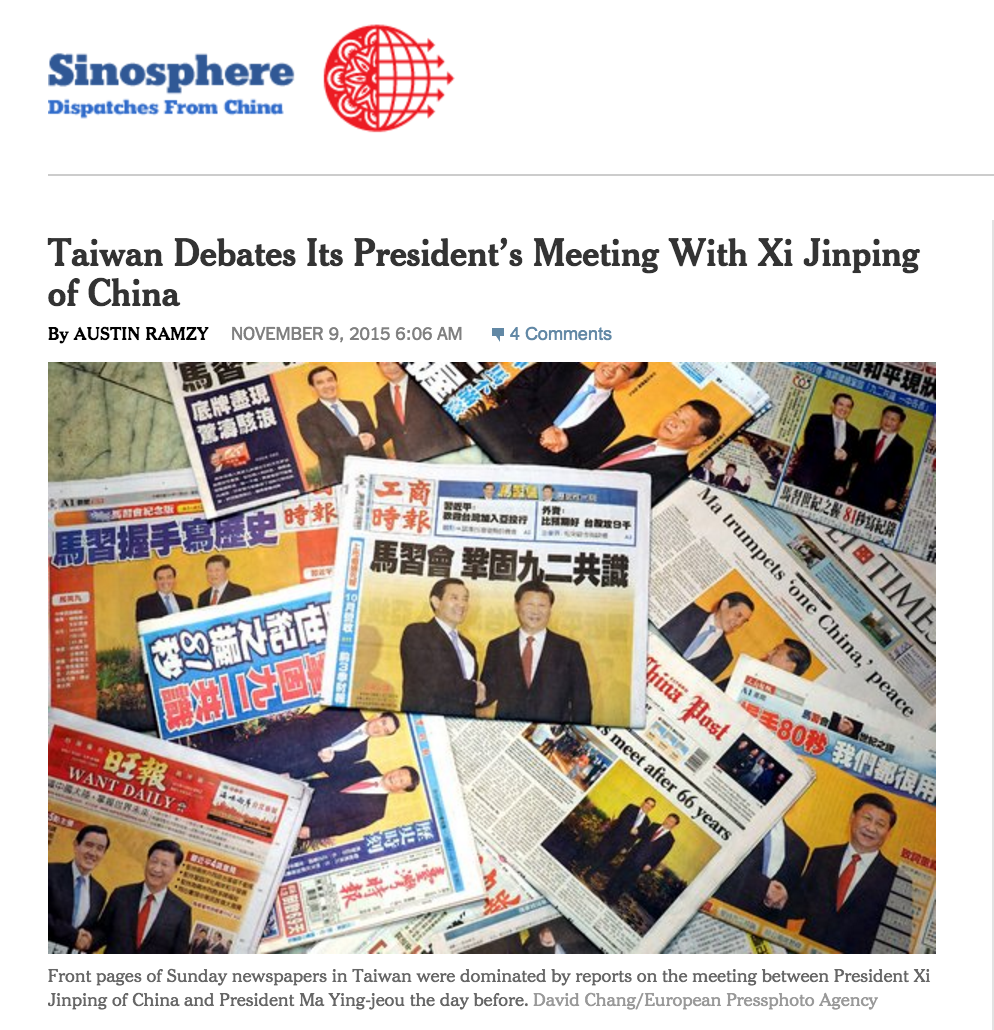by Garrett Dee
語言:
English
Photo Credit: Presidential Office
MA YING-JEOU had scarcely touched back down at Songshan Airport this past Sunday before he found himself having to defend his performance at Saturday’s historic meeting in Singapore with Chinese president Xi Jinping. Ma, accused of displaying an almost obsequious sort of acquiescence to the Chinese view of the state of cross-strait relations by his detractors within both the Taiwanese political system and civil society at large, attempted to vindicate himself by emphasizing the productive nature of the meeting and the opportunities it would open in the future to expand communicative channels between the two sides of the strait.
Soothing as these reassurances may seem to Ma’s supporters, however, they cannot dispel the criticism that has longed plagued the KMT and which has steadily intensified over the past two years of this administration: that the party engages in “black box” politics, selling the country down the river through processes in which decision-making mechanisms operate far removed from the will of the public. The fact that the meeting occurred exclusively behind closed doors makes it impossible to independently verify Ma’s claims of mentioning the Taiwanese constitution and twice bringing up the name “Republic of China” and the idea of “one country, two systems”.
 Image released on social media by Tsai Ing-Wen criticizing the Xi-Ma summit. Photo credit: 蔡英文 Tsai Ing-wen
Image released on social media by Tsai Ing-Wen criticizing the Xi-Ma summit. Photo credit: 蔡英文 Tsai Ing-wen
Ma and his party seem self-assured, however, that the accumulated benefits this meeting will bring forth for Taiwan will quickly make the importance of their role in negotiating it self-evident; indeed, Eric Chu has already begun using the meeting in his campaign as evidence of the responsibility the KMT has shown in their dealings with China and as a promise to the citizenry that this sort of progress in cross-strait relations will only continue to occur if his party remains in power. The party leadership seems to believe that this meeting, by mere dint of its occurrence, raises Taiwan’s future prospects in negotiating with China on issues of importance to both sides of the strait. As raised by Tsai Ing-wen and her supporters in the aftermath of the spectacle, though, a large portion of the public sees Ma’s willingness to negotiate with the Chinese on Beijing’s terms (in a pro-China country, with no mention of Taiwanese democracy in his opening statements, put plenty of platitudes to the notion of a shared Chinese heritage) as weakening Taiwan’s resolve to remain democratic and self-governed in the eyes of the PRC.
The eleventh-hour meeting, announced only a few days in advance, can be construed as an attempt by the KMT to either hamstring the DPP ahead of their period of majority governance, forcing them into a position in which they will find themselves with no choice but to negotiate with the Chinese or risk being seen as stubbornly damaging Taiwan’s future prospects, or to place the KMT in a position from which to launch what I have previously referred to as “shadow diplomacy”: that is, continuing to conduct party-to-party diplomacy with the Communist Party of China despite their almost-assured loss of governing mandate next January.
Additionally, a few steps removed from the immediate analysis that this meeting will have on the upcoming Taiwanese presidential elections, or even the long-term strategic thinking going on in Beijing, an analysis of the reaction in the international media and amongst foreign governments sheds light on where Taiwan figures in their estimation of the state of international affairs.
At first glance, the coverage regarding the event seemed unusually scarce, and upon closer inspection, almost exclusively positive, lauding the progress in the opening of attitudes that led to a willingness on the part of the Chinese to meet openly with a sitting Taiwanese president as a sign of an anticipated amelioration in the over half century long conflict. In an official statement released by the United States State Department, they applauded what they described as “historic improvement in cross-strait relations” and welcomed the meeting between leaders of the two sides as a chance to improve regional stability and cooperation.
This, of course, comes at a time when the United States finds itself locked in an outright power struggle with the PRC, having brazenly sailed warships into the area of the South China Sea that China considers its exclusive territory in defiance of the warning from Beijing that it will not tolerate any challenge to its claim on the waters. When the State Department comes out with a statement praising the establishment of stability in the Asia Pacific region just months after it urged its allies to abstain from becoming founding members of the China-led Asian Infrastructure Investment Bank, it falters under the weight of its own thinly-veiled duplicity towards Taiwan.
Guided by its purposefully-vague “One China” policy and the Taiwan Relations Act, the United States has always contentedly pursued a policy of strategic ambiguity in regards to the self-governance of Taiwan: at times parading the island as a beacon of democracy and a n important strategic ally when China appears unable to object, at other times attempting to reign in the push by the Taiwanese for a more authentic democracy when it fears too intense a reaction from the Chinese. Though supportive of the idea of a democratic Taiwan in theory, the cool reaction of the United States towards the prospects of a Tsai victory and a return to power of the DPP reveals the limits to which they will accept what they view as destabilizing action by the Taiwanese.
Unfortunately, even a purely democratic transfer of power from the KMT to the DPP has been labeled as a destabilizing action in an international system in which Taiwan has almost no leeway to negotiate its own future. By showing almost no support for popular Taiwanese anti-government uprisings like last year’s Sunflower Movement while praising a clandestine meeting held behind closed doors between Ma and Xi, the United States reveals the evolution in its thinking on the subject of its geo-strategic competition with the PRC: we are still willing to go head-to-head with the Chinese, just not over Taiwan.
All this begs the question regarding the role of the non-governmental international media in covering the evolution of events unfolding between China and Taiwan: is no news good news? To elaborate, to what extent does the international media have a responsibility to report beyond the official line of the “progress” and “stability” and fairly represent the polarized and confrontational opinions finding expression within the debate amongst the political active elements of Taiwanese civil society?
 Austin Ramzy’s article in the New York Times. Photo credit: New York Times
Austin Ramzy’s article in the New York Times. Photo credit: New York Times
Austin Ramzy’s recent Sinosphere post in the New York Times, “Taiwan Debates its President’s Meeting with Xi Jinping of China”, paints the debate in the rosiest of terms, stating that although many people in Taiwan have indicated a “wariness” towards the intentions of the KMT with regards to the meeting, general attitudes toward the event tended to skew toward the positive end of public opinion. Though author attempts to remain balanced, his use of the term “wariness” seems a little too weak a word to describe a sentiment that led hundreds of people to gather in the streets in the early morning on the day of the meeting and propelled dozens to even make an attempt to break into Songshan Airport in an attempt to keep Ma’s plane from taking off.
At the other end of the spectrum, one sees a variety of sources willing to embrace the idea that this meeting represented a fundamentally positive shift in relations between the two sides and the opening of the chance for further cooperation between Taiwan and China. Christopher Bodeen at the Washington Post proclaimed that the meeting realized “hope” for both China and Taiwan after only briefly stating that it was “opposed by some” in Taiwan, and Bill Bishop of the widely-read Sinocism China Newsletter argued that the meeting represented the vibrancy of Taiwanese democracy and might even present itself as a “boon” for Tsai in the form of a willingness on the part of more foreign leaders to meet with her after she ascends to the presidency.
There thus seems to exist not merely a troubling disconnect from the perspective of the Taiwanese electorate in regard to the unilateral action taken by their president to push cross-strait relations in a direction unsupported by popular opinion, but also an outright misreading of the situation by foreign governments and media organizations. The popularly-held sentiment that this meeting represented less of an improvement in the future of Taiwan and more an attempt by a lame-duck president to secure continued influence for his party has gone largely unrepresented in foreign coverage of this weekend’s events. That this meeting represented the beginning of a larger trend in the relationship between Taiwan and China towards increased cooperation on the basis of common ties is a gross misunderstanding of the situation, and one that deserves to be rectified by a more responsible media that takes public political discourse in Taiwan as more than a footnote in the development of larger regional events, especially those in which Taiwan directly holds a stake.


 Image released on social media by Tsai Ing-Wen criticizing the Xi-Ma summit. Photo credit: 蔡英文 Tsai Ing-wen
Image released on social media by Tsai Ing-Wen criticizing the Xi-Ma summit. Photo credit: 蔡英文 Tsai Ing-wen Austin Ramzy’s article in the New York Times. Photo credit: New York Times
Austin Ramzy’s article in the New York Times. Photo credit: New York Times